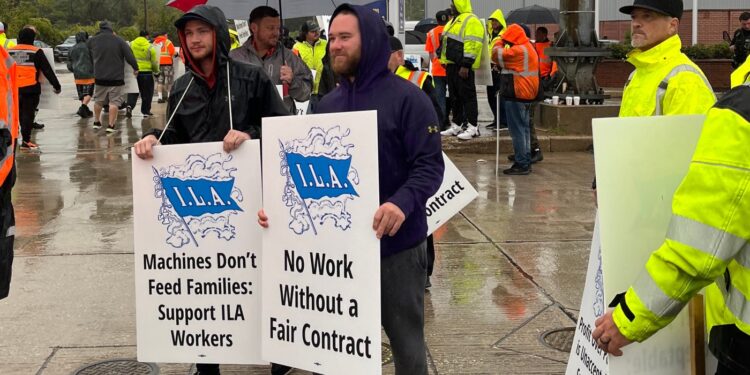
It’s surely no exaggeration to point out that the stakes are high in the dispute between the International Longshoremen’s Association and shippers and port operators that resulted in an ILA strike at East Coast and Gulf Coast ports, including Baltimore, that began at midnight Monday. Dockworkers want higher pay. That’s understandable. The U.S. Maritime Alliance wants to keep down the cost of loading load and unloading ships. That’s understandable, too. But do the parties, including 47,000 or so striking workers, understand the harm they may soon be causing to U.S. consumers, the nation’s economy and Baltimore in particular? And that’s not even mentioning the presidential election, where one more piece of bad economic news might be just enough to tip the scales.
An idle Port of Baltimore spells trouble for the region’s economy. More than 139,000 jobs are directly or indirectly tied primarily to cargo activity. The port generates an estimated $3.3 billion in personal income yearly (with salaries well above the average Maryland wage). And here’s another thought — to stay on our admittedly parochial bent — the Francis Scott Key Bridge collapse in late March had already caused considerable economic hardship. Must we have another crisis so soon? And that’s not even considering the loss of business and supply chain disruptions caused by the COVID pandemic. Every day this strike goes on means trouble for hardworking Marylanders.
We are pleased to hear that the White House has been active behind the scenes and that President Joe Biden supports the longshoremen. Dockworkers typically earn a base salary of $81,000 annually. Given the arduous nature of this specialized line of work, that’s not exactly living in the lap of luxury. Shippers claim to be mindful of the potential costs to inflation-weary consumers if ILA members get paid what they’re asking. And this is the time of year when holiday items are due in stores.
But surely a compromise is possible. One obvious step would be for President Biden to reverse course and invoke the Taft-Hartley Act, imposing an 80-day cooling-off period that would suspend the strike. That may look politically motivated (and perhaps be interpreted as a diss by the upper echelons of organized labor), but it also might be the most viable option. We think postponing the whole matter until after the Nov. 5 election would probably be the best outcome under the circumstances. From a burgeoning war in the Middle East to the disastrous floods of Hurricane Helene, there are enough crises to go around at the moment.
Baltimore Sun editorial writers offer opinions and analysis on news and issues relevant to readers. They operate separately from the newsroom.
Originally Published:






